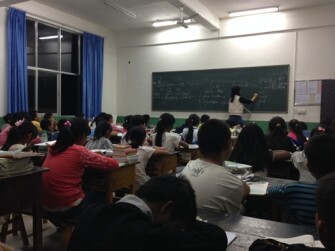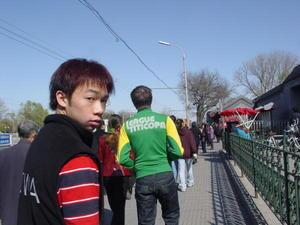
My brother taught me my first major lesson about education in the fall of 2005 when he became the unofficial mascot to my students on the Navajo Nation.
As talented as he is, Dennis did not succeed early or much in school. I shared with my middle schoolers vivid descriptions of how he wouldn’t sit still, didn’t care for school, had few friends and was at serious risk of flunking out of school. My students loved him. He was one of them.
I also described how he was determined to change things around when he was 14 and had hit a low point. He impulsively, but passionately, decided he was going to become a Shaolin monk in China and poured countless hours into martial arts. For the first time, he found major success. I also explained how he transferred this life lesson to his studies, did pretty well in high school and enrolled in college.
Until that point, I had spent the better part of my life horrified by my younger brother’s antics and irritated by the attention, money and heartache my parents poured on him. But when I became an educator, I finally realized that it wasn’t the tutoring, behavior plans or even love that got him to succeed. It was his own vision for what he wanted, his grit to get there, and the confidence that developed when he realized that he could do it - even when everyone thought he would fail.

All of the buzzwords I’d been hearing about education really crystallized for me that fall in 2005 when I thought about my brother - teaching meant improving academic skills and empowerment through knowledge. It was also about fostering students’ passion, vision, grit and confidence. Regardless of how smart they actually were, my brother and my students had to work far harder for those things than I ever had to in school.
I think about Dennis more than ever now that I work in China. When I go into classrooms in our mountain and factory towns, I usually sit in the back row next to the “naughty” kids. These are the kids who are most like my brother - the ones who don’t catch on to what’s taught in class, talk back at their teachers and fail to write anything in their workbooks. These are the kids who know they don’t have a shot in the education system in China because compulsory education is only until 9th grade (but many will drop out way before that), haven’t learned enough academic and critical thinking skills while in school, and lack the realistic confidence that they can be successful one day.
Dennis would undoubtedly have been one of the kids in the back row if our family hadn’t emigrated. Yet, I can’t help but think that if Dennis did grow up in rural China and had the same burst of inspiration and vision for what he wanted in life, he’d also figure out how to be successful in a system that didn’t support him.
These days, I’m still trying to figure out how to foster those crucial soft skills en masse for the kids we serve in some of the poorest communities in the world where the resources, education system, job opportunities and even the inspiration to dream boldly aren’t yet there. If you want to join us in figuring this out in Teach For China, contact me at Jessica.shyu@tfchina.org.